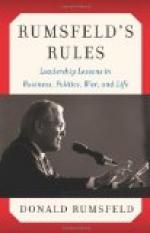But outside of cabinets there were a few men who used their eyes. Sir Charles Dilke took a turn round the globe, and when he came back said “Greater Britain.” That was an idea, and ideas are like the plague—they are catching. Sir John Seeley took a tour through the history of the last three centuries, and said “Expansion of England”; that meant continuity in the Nation’s life not merely in space but in time. Whatever the cause, a few years ago there set in an epidemic of fresh ideas, tending to reveal the Nation as more than a crowd of individuals and the Empire as the Nation’s work and the Nation’s cause. The Government did all it could to resist the infection. Instead of standing up for the Empire it was bent on passing measures in the sense of its own party. It ran away from Russia, from France, and from Germany. But the new ideas grew; every globetrotter became a Nationalist and an Imperialist, and shed his party skin. Then came Fashoda, and Lord Rosebery’s action in that matter killed what was left of party.
The case of the British in South Africa cried aloud for British action. But the Government was still hidebound in bad traditions, thinking that democracy means the tail wagging the dog, not seeing that if the statesman leads straight along the path of duty the Nation is sure to follow him. Happily, a statesman was sent to Cape Town, probably because the Cabinet hardly realised how big a man he was. Sir Alfred Milner mastered his case, thought out his cause, and at the opportune moment put it before the Government. The first result was the Bloemfontein conference. There, with the prescience and the strength of a Cavour or a Bismarck, Milner put the issue: either the minimum concession which will secure the political equality of the two races or war. Kruger’s obstinate refusal of the concessions required showed plainly that it would be war. There was only one possible way of averting war; if fifty thousand men had been at once sent to South Africa, Kruger and his people would have known where they were, and might have accepted possible terms, those offered at Bloemfontein. The moment of the breaking off of the conference was the crisis, and to appreciate men you must watch them in a crisis. Mr. Balfour expressed his unbounded confidence in Kruger’s sweet reasonableness and in the justice of the British cause; he could not believe there would be war. Mr. Chamberlain entered into ambiguous negotiations, beginning in a way that made everyone, especially Kruger, imagine that the Government would accept less than the Bloemfontein minimum. Of preparing to coerce the Boers there was no sign. The Boers began to get their forces in order. In England big speeches were made; “hands” were “put to the plough”; but at the end of July no military force was made ready. At length, when Natal appealed for protection against the Boer army, ten thousand men were ordered so as to bring up the garrison of the colony to some seventeen thousand. After the ten thousand not another man was sent until October 20th.




